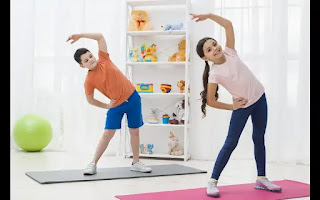Teaching Kids About Personal Fitness Training
Although there are many facets to personal training, it is mainly linked to an adult demographic. Although most of the market comprises adults, trainers may expand their businesses by offering services to youngsters. Working with children in a training capacity is a new challenge that may positively impact their development at crucial times. If you're interested in sending your kids to a training program, keep reading for advice from specialists in the field of kids fitness classes.
 |
| Personal Training For Kids |
Keeping In Mind Why They're Training Is Important
There might be as many different motivations for a youngster to engage with a personal trainer as for adults. According to statistics from the National Child Measurement Program, about 10% of British children in the reception year are fat, while another 13% are overweight. Therefore, parents' concerns about their children's weight are likely to serve as a driving force for personal training for kids.
There are a wide variety of positive outcomes associated with regular physical activity in children, including but not limited to improved health and fitness, weight loss, increased confidence, and increased participation in extracurricular activities. Trainers learn as much as they can about the kids and their families to better assist them throughout training. Young people who see their fitness levels rise also experience an increase in their feeling of pride and accomplishment. As a result, trainers often show compassion and maturity in their teaching methods.
Watch For Signs Of Injury
Children's growth and bone development are still in progress; thus, improper execution of certain activities might be harmful. Bone development isn't complete until a youngster is in their late teens. Hence, they are more likely to be hurt because of the 'growth plate,' a soft tissue formation at the end of each long bone. Trainers offering personal training for kids keep this in mind at all times.
Training, however, may help rather than impede their development. It's a good idea to include weight-bearing workouts like leaping and skipping into enjoyable circuits that promote bone growth. Constant weight-bearing places needless pressure on the growth plates; thus, these exercises should be done rarely and as part of a more extensive, more varied routine. This difference makes sense, given that kids' attention spans are typically lower than those of adults.
Explain To Them Why Exercise Is So Important
No matter your age, you should never discount the value of a healthy body and a regular workout routine. Hence, personal training for kids is essential as they grow up. There is much more to consider when working with youngsters one-on-one than physical activity. In addition to the more apparent gains in physical health and development, training may significantly impact a child's mental health, social development, and academic performance. It's a terrific way to meet new people, practice social skills, broaden their network, and boost their confidence. A student's self-assurance may increase in the classroom's more rigorous subject areas.
Conclusion
Regardless of their aims, children's training and exercise should always be enjoyable. Children will be more invested in their progress and motivated to work on their weaknesses if the lessons are enjoyable. The primary goal of kids fitness classes is to promote health and happiness while also making it enjoyable.


Comments
Post a Comment